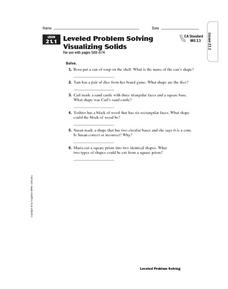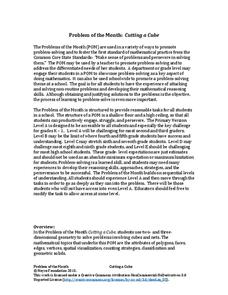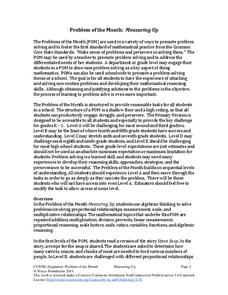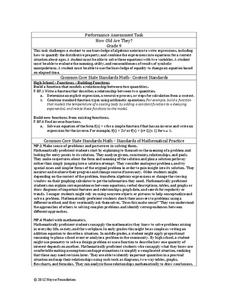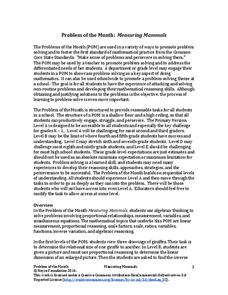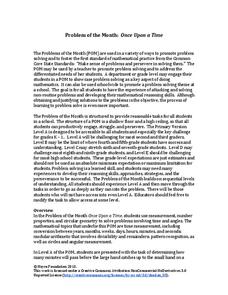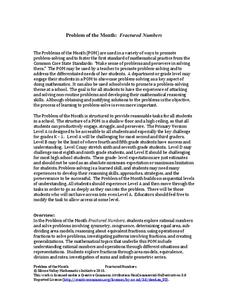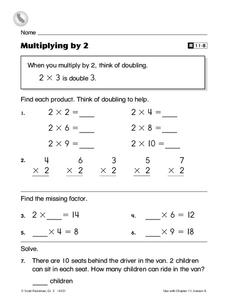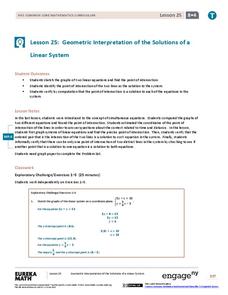Curated OER
Leveled Problem Solving Surface Area of Prisms
In this area instructional activity, 6th graders solve 6 word problems in which they work with the surface area of prisms. They identify faces, length, height, and width of prisms as they solve the problems.
Curated OER
Leveled Problem Solving Converting Metric Units
In this metric units activity, students learn to convert measurements using metric unit measurements. Students solve and convert six problems.
Curated OER
Leveled Problem Solving Circumference of a Circle
In this geometry worksheet, 6th graders solve 6 word problems in which they find the circumference of items that are circles. They find the circumference of items such as a basketball hoop, a cereal bowl, and a circular frame.
Curated OER
Leveled Problem Solving: Visualizing Solids
Connecting academic concepts to real-life applications is an important component of any lesson, especially with such topics as geometric shapes. In this worksheet on geometric shapes, students answer word problems. This worksheet could...
Curated OER
Problem Solving: Graphing Functions
In this graphing functions worksheet, students solve 6 word problems, finding ordered pairs, missing coordinates and numbers, slopes of lines and functions.
Curated OER
Use Guess and Check to Solve Math Problems
In this problem solving worksheet, students read about using the guess and check strategy for solving math word problems. They use the strategy to solve 8 problems. They read about the working backwards and using visuals as problem...
Curated OER
Leveled Problem Solving Multiplying and Dividing Decimals
In order to be able to multiply and divide decimals properly, students need to be provided with a variety of ways to practice this skill. In this basic worksheet, students practice how to multiply and divide decimals using word problems...
EngageNY
Tables of Equivalent Ratios
Don't table the discussion on equivalent ratios — do it now! Scholars create tables of equivalent ratios to represent contextual problems. Pupils go on to use the tables to answer questions within the context. The lesson is ninth in a...
EngageNY
Mid-Module Assessment Task: Grade 7 Mathematics Module 3
Lesson 16 in the series of 28 is a mid-module assessment. Learners simplify expressions, write and solve equations, and write and solve inequalities. Most questions begin as word problems adding a critical thinking component to the...
Noyce Foundation
Cutting a Cube
Teach the ins and outs of the cube! A series of five K–12 level activities explore the make-up of the cube. The beginning lessons focus on the vocabulary related to the cube. Later lessons explore the possible nets that describe a cube....
Noyce Foundation
Measuring Up
Teach the basics of measurement and conversion with a five-lesson resource that builds an understanding of proportion and measurement conversion from elementary through high school. Initially, young scholars use ratios to determine soup...
Noyce Foundation
The Shape of Things
Investigate the attributes of polygons. A thorough set of lessons presents problem scenarios for elementary through high school classes. The first lessons focus on basic characteristics of polygons, including the line of symmetry. As the...
Mathematics Assessment Project
Modeling Motion: Rolling Cups
Connect the size of a rolling cup to the size of circle it makes. Pupils view videos of cups of different sizes rolling in a circle. Using the videos and additional data, they attempt to determine a relationship between cup...
EngageNY
From Ratio Tables to Equations Using the Value of a Ratio
Use the value of a ratio to set up equations. The teacher leads a discussion on determining equations from ratio tables in the 13th portion of a 29-part series. Pupils determine which of two equations to use to find the solution....
Inside Mathematics
How Old Are They?
Here is a (great) lesson on using parentheses! The task requires the expression of ages using algebraic expressions, including the distributive property. Pupils use their expressions to determine the individual ages.
Noyce Foundation
Measuring Mammals
Explore the meaning of scale and proportion with a set of five activities that examines the topic from elementary through high school. The first lessons explore ratio by examining pictures of different sizes. The next three activities...
Noyce Foundation
Once Upon a Time
Examine the relationship between time and geometry. A series of five lessons provides a grade-appropriate problem from elementary through high school. Each problem asks learners to compare the movement of the hands on a clock to an angle...
Noyce Foundation
Miles of Tiles
Create number sentences and equations to solve geometric problems. Each activity in the series of five asks young mathematicians to consider different-sized tiles to build structures according to specific criteria. The first activities,...
Noyce Foundation
Fractured Numbers
Don't use use a fraction of the resource — use it all! Scholars attempt a set of five problem-of-the-month challenges on fractions. Levels A and B focus on creating fractions and equivalent fractions, while Levels C, D, and E touch on...
Virginia Department of Education
Nonlinear Systems of Equations
Explore nonlinear systems through graphs and algebra. High schoolers begin by examining the different types of quadratic functions and their possible intersections. They then use algebraic methods to solve systems containing various...
Curated OER
Study Buddies: Adding Two-Digit Numbers
Some times a simple lesson is all you need. Here are 2 worksheets that can be used as a lesson on problem solving, addition, and partner work. The first worksheet has learners use a tens and ones charts to practice adding simple...
Savvas Learning
Multiplying By 2
In this multiplication worksheet, math masters solve 10 fill-in-the-blank problems using the strategy of doubling. Next, answer four questions in which they find a missing factor in a multiplication problem. Finally, they try their...
EngageNY
Geometric Interpretations of the Solutions of a Linear System
An intersection is more than just the point where lines intersect; explain this and the meaning of the intersection to your class. The 26th segment in a 33-part series uses graphing to solve systems of equations. Pupils graph linear...
Illustrative Mathematics
Party Favors
Pia is putting stickers into party bags. She starts by putting 10 stickers in each bag, and over the course of a week she adds several bundles of ten stickers to each bag, as well as making more bags. Second graders must find the number...



